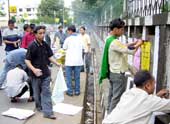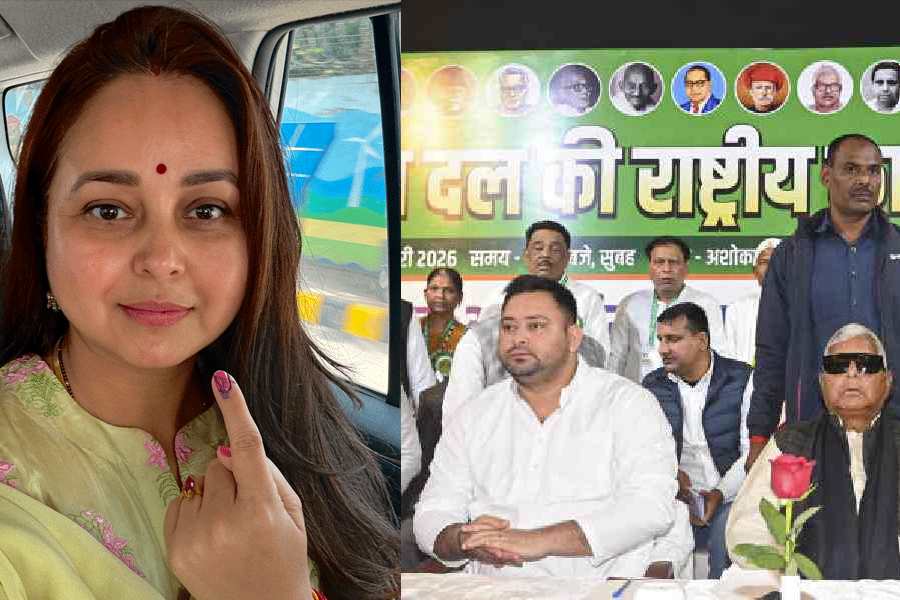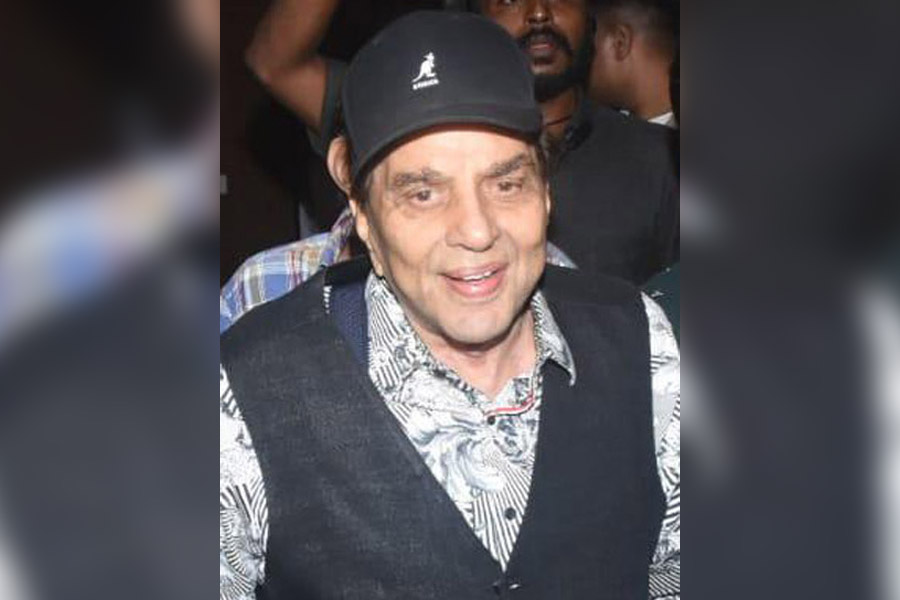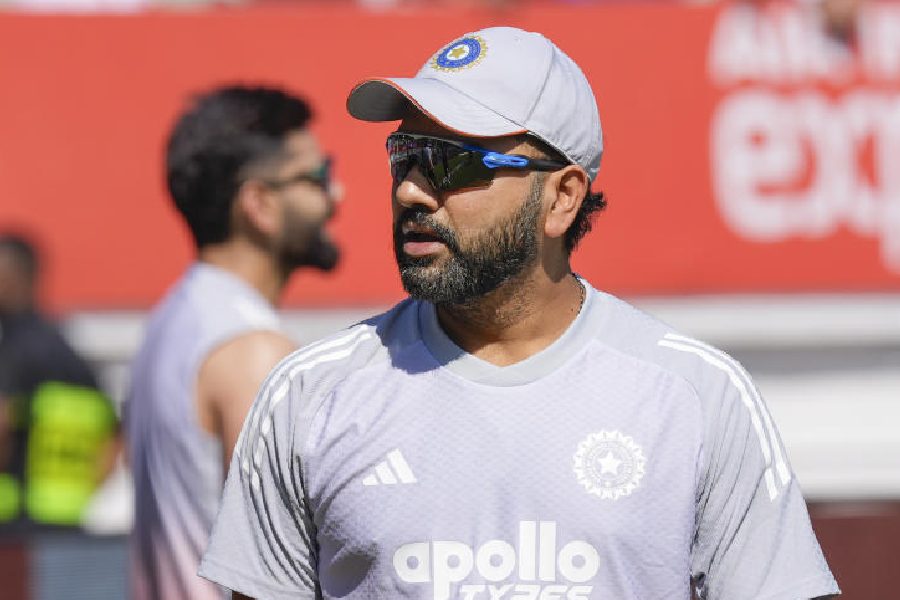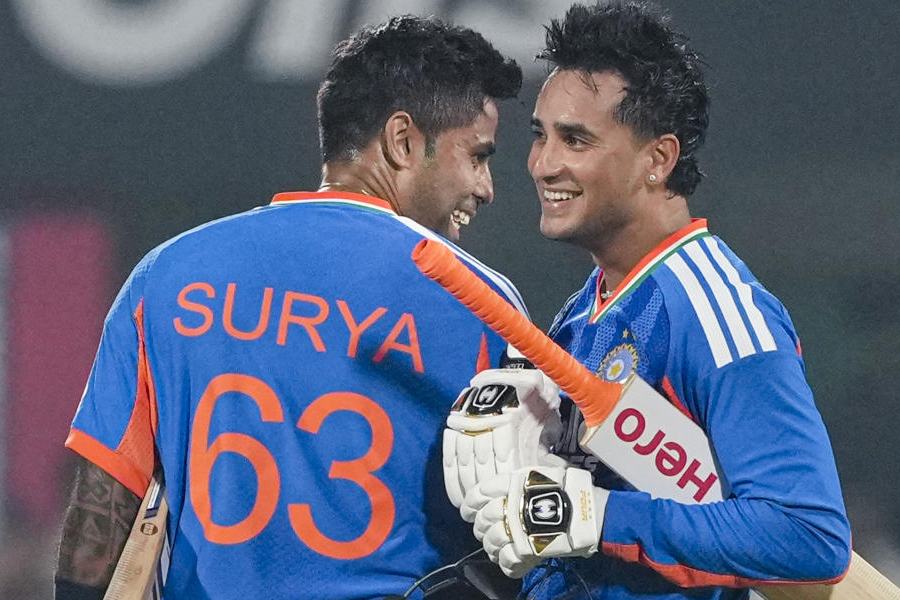 |
| Members of the Khasi Students? Union paste posters as a mark of protest on the main Secretariat wall in Shillong recently. Picture by Eastern Projections |
Meghalaya is rumbling once again. We are back to the grand old era of bandhs, roadblocks, office picketing and what-have-you. Somebody has rightly said that conflict lies latent as long as people are ignorant of their rights. It surfaces and becomes an active ingredient the moment people know they have rights they can claim and then set about claiming those rights. In the case of Meghalaya, the present stand-off between the government and the Khasi Students Union (KSU) is not about the conflict of previously unclaimed rights. It is perhaps more of a political game ? a game of one-upmanship arising out of the recent distribution of loaves and fishes by D.D. Lapang, Meghalaya?s controversial chief minister.
It is no secret that the Khasi Students Union, despite their written constitution which specifies that they are not to be involved in politics, has always had strong political leanings. Their leaders have somersaulted into the political arena. Before the last general elections, the union spawned a political party ? the Khun Hynniewtrep National Awakening Movement (KHNAM). Paul Lyngdoh, erstwhile president of the KSU, was one of the two candidate elected from the KHNAM. Two candidates do not usually make a viable or formidable coalition partner. But Lapang roped in both KHNAM members into the Meghalaya Democratic Alliance (MDA) government and gave them lucrative portfolios.
After the downsizing last year, one of the KHNAM legislators was dropped from the list of ministers, but Paul Lyngdoh continued to remain a Cabinet minister. This says something about the clout that the KHNAM exercises over the MDA government. Much of that clout comes from the fact that Paul Lyngdoh has the overt and covert backing of the KSU. When Lapang inducted Paul Lyngdoh into the ministry, he did so with the hope that the KSU would be under a tight leash because they would not want to embarrass a government in which they have a personal stake in the person of Paul Lyngdoh.
But obviously things have not worked out the way Lapang and some of his smart backroom boys assumed they would. Today it is doubtful if Paul Lyngdoh still has a grip over the KSU. Ties between the KHNAM and the KSU seem pretty fragile and this is but natural. It has taken a while for Samuel Jyrwa to emerge out of the shadows of Paul Lyngdoh and to be popularly recognised and accepted as the president of the union. Paul Lyngdoh has always possessed an unmistakable charisma and was a natural leader even if much of that leadership came from his ability to be successful rabble-rouser playing with people?s sentiments.
Anyone heading the Khasi Students Union for any length of time cannot but develop political ambitions of his own. No one will blame Samuel Jyrwa or his secretary Hamlet Dohling for nursing similar ambitions. But they can rise to fame only if they appear to be taking up issues that appeal to the public. In the recent past, the KSU has taken up the issue of uranium mining together with the Meghalaya People?s Human Rights Council (MPHRC).
Joining issue with them are some individuals who have always been antagonistic to any sort of nuclear build-up. In most other states, organisations would flag issues of public importance only for public mobilisation. Having done that, they would push the issue forward as a people?s movement ? not as a KSU or MPHRC movement.
Sadly, here in Meghalaya issues are identified with organisations. People talk of the right to information movement as spearheaded by the Mait Shaphrang Movement led by Micheal Syiem, a former KSU president. Although other organisations have come together to press forward the demand for the Right to Information Bill, they are mentioned only in passing and do not appear to be considered important enough to be identified as the sole movers of the issue.
One issue that is engaging the minds of the KSU today and for which they are putting the government in the dock is that of the Meghalaya Board of School Education (MBOSE). Lack of experienced manpower starting right at the top and lack of accountability has made the board a lame duck institution, committing one mistake after another. Question papers have leaked, marking of answerscripts has been unreliable and recently there was a shortage of mathematics question papers for a particular centre in Shillong. Everyone agrees that the MBOSE needs an urgent overhaul, a re-strengthening of the board as it were. But the KSU wants something more than that. They want the MBOSE to be bifurcated and the Higher Secondary Board to be located in Shillong instead of its present location in Tura.
In Meghalaya, things can go very wrong because of the fragile relations between the Khasis and the Garos. Even the best of suggestion never fails to take on a communal tinge. The Garos see the KSU demand as a highly communal one because instead of asking for an effective MBOSE, the union is demanding yet another Shillong-based institution on the plea that the board would function better and more effectively from Shillong. To press their demands, the KSU has lined up a series of agitation programmes, which have affected trade and commerce, particularly the hotel and tourism industry. Also affected by the bandhs and road blockades are the farming communities from across the state. Cabbages, tomatoes and a variety of fruits will have to find their way to the markets or rot. If the KSU agitation is going to carry on, then farmers will be adversely affected.
Yet the government seems unable to put its act together. A government is elected to do the right thing, in this case to do what is best for the student community. Arguments that any institution located in Shillong will function flawlessly are rather simplistic. Relocating the MBOSE in Shillong would of course help one section of civil servants from a particular community who do not want to take up vacant positions in the MBOSE in Tura.
This community wants to have their cake and eat it, too. Shillong is a comfortable base and they believe it is their birthright to operate from the state capital even though each government employee necessarily gives an undertaking that he/she is ready to serve in any part of the state. Such groups are in support of the KSU demands for their own selfish reasons.
Coming to the KSU, the union knows that it needs to rake up enough issues before the next general elections in 2008. This is already 2005 and time does fly on angel wings. If the union does not appear to be putting the government on trial, it may be accused by the people of having been co-opted into the establishment along with Paul Lyngdoh. It is necessary for the union to live up to an image of being non-compromising and also of maintaining a respectable distance from the KHNAM. One can sympathise with the KSU for having to walk the tightrope of putting up different images for different purposes. What one must oppose is the union?s attempts to take Meghalaya backwards to the same old drama of agitation, which leaves a very serious impact on the student and farming communities.
It is a shame that the Lapang government is so weak-kneed that it is unable to call the bluff of the students? organisation. All of this springs from the fact that Lapang is himself facing a serious credibility crises with his repeated attempts at subverting the system for personal gains. What about the other MLAs who had been very vociferous in their critique of Lapang?s style of functioning after they were dismembered from the top-heavy Cabinet. Their strident voices, it appears, have got subsumed by mainstream politics, which again is all about power and more power, not for the people but for themselves.

